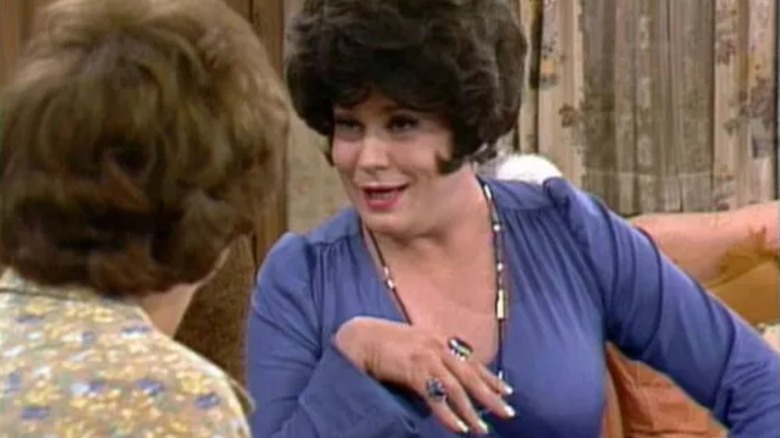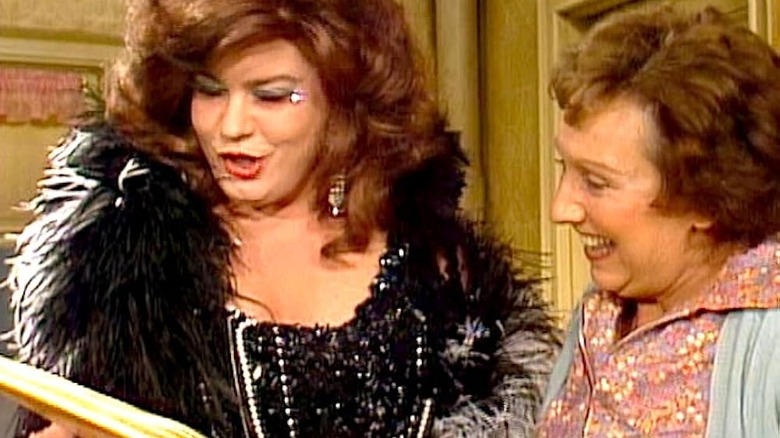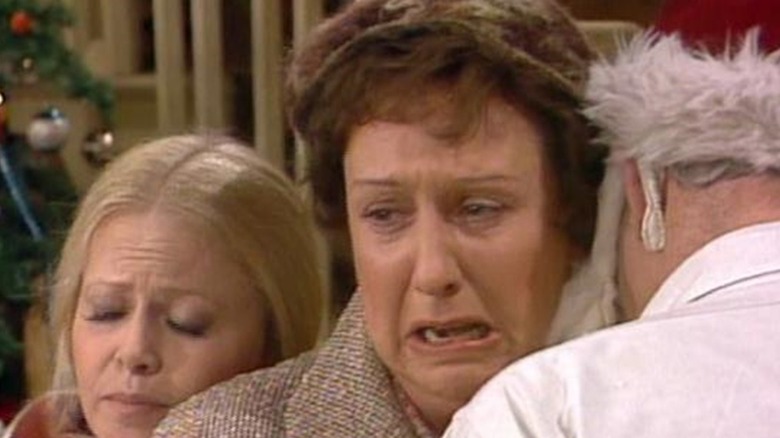All In The Family Struggled To Resolve A Tough Edith Bunker Plotline
In the "All in the Family" episode "Archie the Hero" (September 29, 1975), the bigoted Archie Bunker (Carroll O'Connor) saves the life of an unconscious woman in the back of his taxicab by giving her mouth-to-mouth resuscitation. Later, the woman, Beverly LaSalle (Lori Shannon) comes to Archie's place to thank him for his good deed, and Archie is surprised to learn that she was, in fact, a man in women's clothing. Archie — as was the central shtick of "All in the Family" — must struggle through his bigotry and come to terms with the fact that he, gasp, put his mouth on another man's mouth. Lori Shannon, incidentally, was the drag queen persona of standup comedian Don Seymour McLean, a celebrity in the comedy scene until his death in 1984.
In "Archie the Hero," Edith (Jean Stapleton) immediately loves Beverly, and the two become fast friends. Archie is still an a-hole about it but begrudgingly accepts that his wife is close friends with a drag queen. Beverly even returned for the episode "Beverly Rides Again" (November 6, 1976) wherein Beverly's drag persona is wielded to play a prank on Archie's annoying friend Pinky (Eugene Roche).
Beverly also returned for a tragic, intense episode called "Edith's Crisis of Faith" (December 18, 1977) and audiences learn that Beverly's fate was dark and sad. It seems that Beverly, while walking with Mike (Rob Reiner) at Christmastime, is attacked by a gang of bigoted homophobes. Beverly is beaten to death. Edith is struck particularly hard by Beverly's murder, and loses her faith in God; why would God allow so much hate in the world?
In a 2014 interview with Deadline, show creator Norman Lear revealed his admiration for the episode, dealing sensitively as it did with homophobia and a crisis of faith.
Edith's Crisis of Faith
Edith having a crisis of faith was a big deal in "All in the Family," as the character was previously devoutly religious. It was especially rare for a beloved character to be killed. Norman Lear revealed that "Edith's Crisis of Faith" was the type of harrowing, emotionally difficult story he had always wanted to tell. Lear ran down a brief history of the character of Beverly and how she came into the Bunker household, and how her death would effect Edith.
The issue arose with how the story would conclude. Lear said:
"So, Archie, he was confronted with having put his mouth to [a man's], but Edith fell in love with him/her, and we did a couple of shows after that where she was a guest on the show. What could cause Edith Bunker to lose her faith? And I thought, 'This woman, this character is killed for being who she was.' Edith couldn't imagine a God that could allow that. She lost her faith in one episode. Now, we couldn't air that episode until we knew how she regained it. Didn't have to be successive but she had to regain her faith."
It's worth noting that Archie Bunker is an old-world conservative who takes Christianity very seriously, and often lambastes people for being potential atheists. If Edith were an atheist, it would fundamentally change the central relationship of the series. Lear felt personal pressure to return "All in the Family" to the status quo, which meant Edith had to, at least partially, begin believing in God, at least partially, once again.
Of course, after a harrowing event like Beverly's death, the "Family" writers spent many miserable hours asking how that might happen.
Paradise regained?
Edith regaining her faith was also, Lear implied, a demand from the network. When asked if he and the network were on the same page, Lear said:
"Oh, there was no question. I mean because her loss of faith was going to be significant. We couldn't figure out how she would get it back. We sat around and talked about it. At some point, weeks and weeks later, somebody innocently asked, 'What happens to Archie when she loses her faith?' Son of a b****. In that answer the regaining of her faith was inherent. She had to regain it to save him because he depended on a strong Edith."
It's a pity Edith wasn't allowed to follow her own faith journey over the death of a loved one. It's even more of a pity that Beverly had to die. Jean Stapleton and Carroll O'Connor give amazing, mournful performances, however, and both are truly moved by Beverly's death and the hateful injustice that came with it. Some authors of a certain age recall seeing Beverly on screen, realizing that she might have been the first openly, non-demonized queer character they encountered in popular media.
Beverly's death was also a reflection of the real-life violence queer people encountered every day. Only a few years before Beverly appeared on "All in the Family," the UpStairs Lounge, a queer club in New Orleans, was burned down. 32 people died and 15 were injured. Incidents of "gay bashing" were common. "All in the Family" bothered to address the violence just outside of viewers' doors. It also still appears to be timely in 2024.


